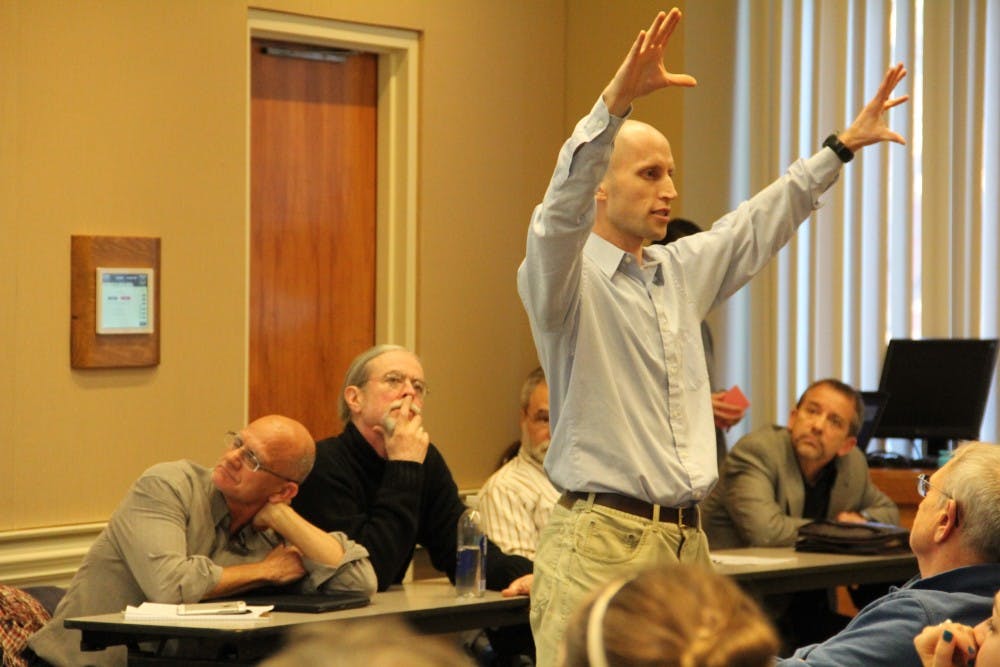Last Updated: Wednesday, Feb. 17 at 12:35 p.m.
Elon University panelists explained how they found ways to avoid choosing between faith and science. “Evolution and Religion: Does human evolution represent a threat to my faith?” offered community members a chance to ask how to bridge the gap between religious and scientific thoughts.
The panelists included Professor of Sociology Thomas Arcaro, Senior Lecturer in Religious Studies L.D. Russell, Associate Professor of Biology Dave Gammon, Professor Emeritus of Health and Human Performance Michael Calhoun and Adjunct Instructor in Communications Mark Fox.
Each panelist gave a brief background of himself and how his faith, or lack thereof, has tied into his work Feb. 11. Russell began by sharing the development of his faith as a young person.
“I had a huge religious experience in high school, and I became very religious,” Russell said. “In that particular form of religiosity, I saw the very idea of human evolution as a huge threat to my faith. And I worried about it a lot …[Religion] formed who I was. It gave me a lens on the world.”
Gammon, who prepared slides to present to the audience during his introductory time slot, explained that while many U.S. citizens accept the idea of evolution for every other species, it only becomes an issue in terms of human development throughout the millennia.
According to Gallup poll results as recent as 2014 (which Gammon referenced in his short presentation), 42 percent of adults in the United States believe God created humans in their current state and that human evolution did not happen.
Gammon’s last slide revealed that, for him, “Evolution explains human nature … but God explains human potential.”
One audience member later asked a question pertaining to exactly that — how non-religious people answer the questions of how and why humans exist.
“We need to consider the terms in which we are even talking about this issue and transcend this understanding that it’s all about us,” Russell said.
"We need to consider the terms in which we are even talking about this issue and transcend this understanding that it’s all about us."
L.D. Russell
Senior Lecturer in Religious Studies
He continued, stating that while religion offers a pathway to understanding for many people, it is not the only way in which humans have searched for the answers to those same questions throughout history.
“I tend to see the scientific endeavor as a similar search,” he explained.
There was disagreement at one point among the panelists about the relevance of the Bible and other religious texts when attempting to reconcile religion and science today.
Gammon said that because the Bible was written thousands of years ago, it was not written with the intent to be used as a foundation for scientific beliefs, and “to try to reconcile it is like grasping for straws.” Instead, he offered ways in which books of the Bible — especially the first, Genesis — could be interpreted in a way that could shed light on God’s possible role in evolution.
It is all in the phrasing of the book: God “let” things happen, Gammon emphasized. He theorized that while God may have created the initial universe, its scientific evolution into our current world could hypothetically just have been set into motion by God’s initial creations.
Arcaro also weighed in, stating that one’s religious beliefs can, in some cases, “negatively” impact contemporary culture, tying it into political and social issues as well as scientific endeavors.
“That is problematic as we move forward, looking to a book not written to these times as direction,” Arcaro said.
Fox disagreed, saying that the Bible was written for all times and does not expire.
“I’m standing on the word of God because I believe the word of God is true,” he said. “I believe [the theory of evolution] is still a hypothesis ... I’m not going to stand on that because it’s not valid.”
When an audience member questioned how panelists’ colleagues with backgrounds in the hard sciences perceived their faith in the workplace, no panelist cited negative receptions.
“They seem remarkably tolerant of my faith. They often don’t agree with it, but they seem far more openminded than you’d expect,” Gammon said. “Science can’t touch faith — not easily, anyway.”
Sophomore Emily DeMaioNewton, an intern at the Truitt Center for Religious and Spiritual Life, was asked to moderate the panel discussion in McKinnon Hall because she was unbiased — she does not come from a Christian background.
While the discussion focused solely on the relationship between evolution and Christian traditions, she admired the diverse viewpoints within different sides of the issue.
“It tends to mostly be Christian traditions that find dissidence with evolution, at least in the mainstream,” DeMaioNewton said.
DeMaioNewton said she appreciated how the panel gave the audience an opportunity to listen to various perspectives, ranging from sole acceptance of evolution or religion to views that fell somewhere in between the two ends of the spectrum.
“The discussion was more comprehensive than I expected,” she said.


